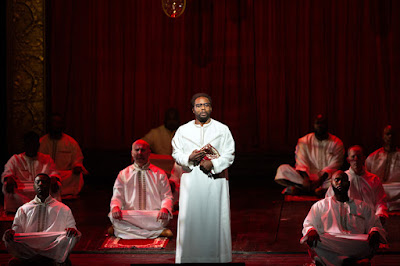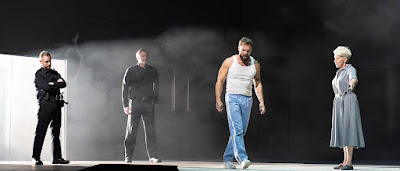Daniel Catán - Florencia en el Amazonas
Metropolitan Opera, New York, 2023
Yannick Nézet-Séguin, Mary Zimmerman, Ailyn Pérez, Gabriella Reyes, Mario Chang, Mattia Olivieri, Nancy Fabiola Herrera, Michael Chioldi, Greer Grimsley
The Met Live in HD - 9th December 2023
Regardless of what you think about the artistic merits of the opening productions of the Metropolitan Opera's Live in HD Season, there is a clear intent to extend the range of opera and the opera audience and an important part of that is bringing new works to the stage, new works at least as far as being presented at the Met is concerned. Opera deserves this kind of progressive renewal, its means of expression through music and drama meaning that it can be many things, with each composer free to express their own character, culture and ideals. Spanish language composers don't however have much of a tradition of opera, certainly not in comparison with Italian and German language opera. Daniel Catán's 2016 opera Florencia en el Amazonas is therefore a vital work to be put on at the Met, a work that has the opportunity to fully express Latin American passions. It certainly has that, but is passion all opera is about? Does it not need some depth as well? Some truth?
Well, that would be for the individual to determine how successful the opera and the production is at finding and presenting those qualities that the work has to share. Passion is certainly a defining characteristic of Mexican art and drama in my experience, to the extent that it can be a little overwhelming and come at the expense of subtlety and genuine feeling. You only need to see the expression of Rolando Villazón presenting the Met Live in HD presentation of the opera, and the enthusiasm of the singers being interviewed during the interval to get that impression. I realise that this is a broad generalisation informed on my part only by limited experience mainly of Mexican cinema, but it's a view that isn't changed after seeing Catán's Florencia en el Amazonas.
Without wishing to undervalue the skill and beauty of the composition - one thing that is undeniable is that Florencia en el Amazonas is a truly beautiful opera of Straussian musical richness - the impression is that it verges on being a parody of an opera. There is nothing inherently wrong with that, and Strauss and Hofmannsthal flirted with that idea in many of their operas (Capriccio, Ariadne auf Naxos, even Der Rosenkavalier). In some way however Florencia feels like it's more of an opera about opera, or about the power of opera, and not just because the main character of the work is an opera diva, although that is telling in itself.
The setting at least is one that is given to the rich extravagance with which it is treated. It takes place in the early 1900s on a steamboat, El Dorado, that is making its way though the Amazon rainforest on the way to Manaus, where the legendary opera singer Florencia Grimaldo is appearing at the reopening of the famous jungle theatre. Among the passengers are a couple whose marriage has cooled down, Rosalba, a journalist who is writing a biography of Florencia Grimaldi, and - unknown to all on board - the great diva herself, returning to the place where she started out on her career before becoming famous in Europe. She is also harbouring a desire to see Cristóbal, a former lover who was an inspiration to her.
That's the setting. In terms of plot, there really isn't much to talk about other than what transpires between the characters and within them, but that doesn't stop the on-board romance that develops between Rosalba and the captain's nephew Arcadio or the quarrels between the married couple Paula and Alvaro from being pitched at a very high emotional level. As if that is not enough there is also a mystical figure, Riolobo, acting as a commentator and in some way an influence over what transpires between the passengers; a spirit of the river if you like, although there are plenty of other exotic creatures seen as the steamship progresses through the overheated atmosphere of the Amazonian rainforest.
Directed by Mary Zimmerman, the Met's production matches the colourful nature of, well ...nature in the Amazon region, recognising that at heart the work is a celebration of life and nature. There's not too much realism here (none whatsoever in fact), Riccardo Hernández's sets absolutely beautiful to look at, the costumes of the creatures worn by dancers colourful and inventive, with the dancers dressed as waves even spilling over onto the deck of the steamboat a lovely touch, but it's all a little bit kitsch. That's traditionally Mary Zimmerman and the Met for you, but you'd have to extend that description to Daniel Catán, as this suits his opera perfectly. Musically it flows - overflows really - with expression, the heightened pitch constant and rising to such an extent that you would think there is little room for it to go anywhere after the first act. Well hold on to your opera glasses because it continues to soar higher in Act II.
There is nonetheless much to admire in this. The music is exquisite, Straussian in its rich orchestration and melodies, Puccinian in its romanticism, giving the singers some wonderful parts to sing, challenging too since they rarely vary in pitch or intensity. It's like you get one 'un bel dì vedremo' after another. If this sounds like it could become tiring on the listener, imagine how it must be for the singer. Having said that it is clear that the cast relish such an opportunity and the quality of the singing is extraordinarily good. Ailyn Pérez is a revelation singing in her native Spanish language with the arias that Catán has written for the role of Florencia, but Gabriella Reyes’s Rosalba is no less prone to soaring emotions, or indeed Mario Chang as Arcadio. All are hugely impressive in sustaining this and attempting to give it meaning, but it still feels a little hollow and performative, lacking in any real depth.
A great deal was made of the fact that the librettist, Marcela Fuentes-Berain studied under the Nobel Prize winning Colombian author Gabriel García Márquez, but I felt that the connection was overstated as a reason for the opera and the production to indulge in magical realism. Here the opera puts forward the idea that life itself is beautiful, magic, and that the experiences and pains we endure are transformative and find expression in art. There is however not a single moment in the opera that feels like it has any connection with truth or reality. One thing I do admire however is its optimism, something that is rare in traditionally tragic opera of this kind. Florencia’s epiphany at the conclusion, finding the meaning of love in the time of cholera is like a validation of 'un bel di vedremo' (or 'un día precioso veremos' here maybe), where she somewhat appropriately becomes a Señora Mariposa. Sadly, that's not a sentiment greatly in accordance with our current troubled times.
It would be unfair to describe such beautiful music and the optimistic outlook in Florencia en el Amazonas as a weakness, since it's not easy to determine whether it's the opera that is at fault or the production which perhaps over-indulges it. Like many 'flawed' opera works I'm sure it could be 'redeemed' by the right kind of production, one that really seeks to explore it and put it through its paces, one that takes the opportunity to examine it in more depth than Zimmerman and the magical realism trappings to see whether there is a germ of truth and realism in there that can be brought out.
Perhaps at this stage however it's more important that this is even being put on at the Met as a true representative voice for Spanish language or Latin American opera. I recall however that I might have said something similar about Catán's Il Postino over a decade ago, that it was a work that also has the potential to cross-over, to reach and touch a new audience for opera. Opera trends don't move at a great pace, so it might take another generation for that to happen, but while Florencia en el Amazonas might not have made a great impression on me, I have no doubt that is capable of inspiring others.
External links: Metropolitan Opera, The Met Live in HD
Photos: Ken Howard / Met Opera

































